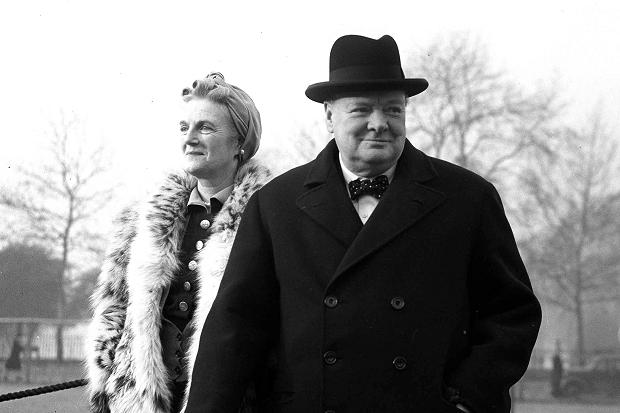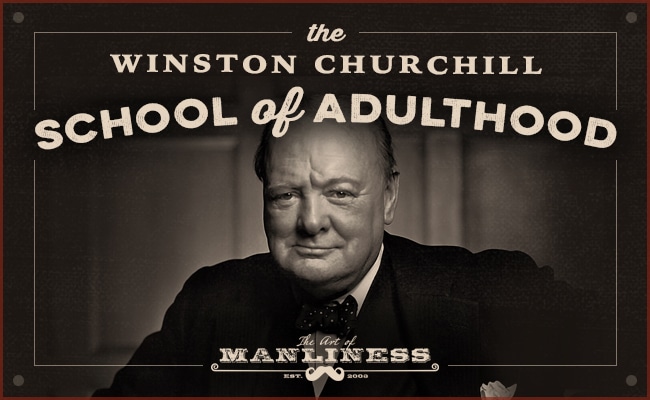
When Neville Chamberlain brought Churchill into his cabinet in 1939 to serve as First Lord of the Admiralty (meaning he ran the British navy), Winston hit the ground running. He took charge of every element of the war at sea, and began strategizing about how to improve things at all levels. The heart of his control center was his black dispatch box; Manchester describes its contents:
“Inside were numbered folders containing papers approximately 16″ x 13.″ The first one, the ‘top of the box,’ as it was called, dealt with matters considered ‘really urgent’…Below the top were folders containing military and foreign office telegrams, reports from the Chiefs of Staff…answers to questions he had raised concerning every aspect of British life—food supplies, crop yields, railroad capacity, coal production. Nothing escaped his attention.”
Each morning Churchill would go through his dispatch box and issue a seemingly never-ending stream of memos to his fellow ministers and military commanders. If he signed a dispatch in red ink, it meant he wanted action taken on it; an attached slip labeled “Action This Day” constituted “the prime ministerial equivalent of a five-alarm fire.”
Churchill’s colleagues sometimes found the sheer number of memos he disbursed onerous; they did not, Manchester writes, “appreciate Churchill’s grasp of all the issues, not only those issues apparent to everybody but also those apparent only to himself.” Churchill’s single-minded goal was defeat of the Nazis, and he made sure he was on top of every detail of how the effort towards victory was progressing.
Yet even though Churchill could be hard-nosed, grounded, and highly detail-oriented, he was also, Manchester says, “an unrepentant romantic.” And it was this quality, more than any other, that allowed him to win the war. And, we would add, to have an awesome adulthood.
Winston Churchill’s Romanticism

“Wanderer Above the Sea of Fog” by Caspar David Friedrich. They say a picture is worth a thousand words, and even if you don’t know much about Romanticism, all you need to understand about it can be found in contemplating this painting.
While we commonly use “romantic” these days to describe the ardor of relationships, today we’re talking about Romanticism with a big R: a life philosophy that prizes the rejection of pure rationalism in favor of intuition, imagination, and emotion; the embrace of nonconformity and sincerity; a tendency towards nostalgia; and the celebration of curiosity, spontaneity, and wonder. Churchill had all these qualities in spades, and they fed the inexhaustible wellspring that refreshed his buoyancy and enthusiasm until the end of his days.
A Sense of Wonder
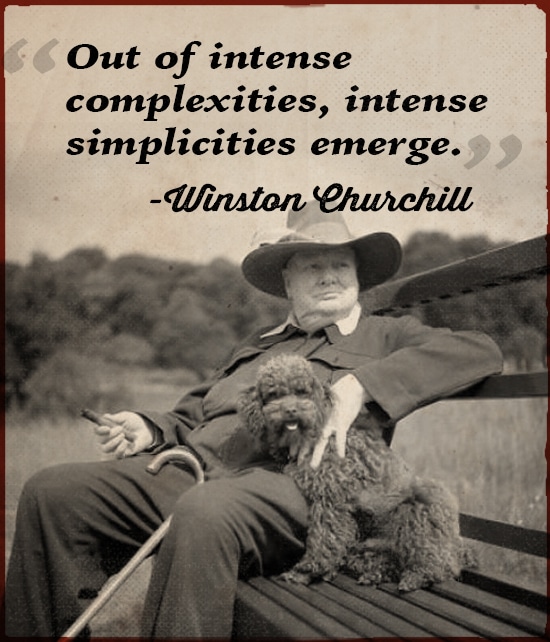
Even as he matured into one of the 20th century’s greatest statesman, Churchill never lost his earnestness and boyish wonder about the world. His friend Violet Bonham Carter attributed this quality to his lack of formal education (he attended a military academy instead of a liberal arts college). Churchill, she observed, lacked the jaded cynicism that one often picks up at a university along with a sheepskin, and was invigorated by simple truths that others found cliché. “To Winston Churchill,” Carter wrote, “everything under the sun was new—seen and appraised as on the first day of Creation. His approach to life was full of ardor and surprise. Even the eternal verities appeared to him to be an exciting personal discovery.”
Wonder is innervated by a sense of curiosity, and Churchill kept his continually nourished with a steady diet of contemplation, travel, adventure, and the lifelong study of history (more on those latter three pursuits in future installments). Whether in a book or a foreign land, he was always experiencing the delight of discovery.
An Imaginative, Epic View of Life
Romantic artists sought to create original works that sprang from their unfettered imagination. While Churchill was an avid painter in his spare time, the greatest canvas for his imagination was truly life itself. He refused to see the world as dull and constrained, but rather viewed it as a magnificent, wide-open landscape of possibilities, where the forces of good and the forces of evil did battle. Any man, who had the courage and will, could make himself a hero and join the fight.

Through the power of words, Churchill brought to life his romantic, heroic vision of the world — both for himself and for his countrymen. Many of the original products of man’s imagination are initially greeted with scorn, and Churchill’s rhetorical style was no different. Before the war, his critics felt him to be overly naive and found his oratory hyperbolic and overwrought. Even Churchill’s “blood, toil, tears, and sweat” speech – now remembered so reverently – was dismissed by many at the time as just another dose of his exaggerated schmaltz.
But as the crisis deepened, it was Winston’s singular vision that fueled his indomitable fire and fight. The war was merely a vivid, large-scale manifestation of the epic way he had always seen the world, and with the forces of evil advancing, defeat was simply not an option.
So too, Churchill was able to paint such a rich, romantic picture of the war in his speeches, that his countrymen could actually step into it and partake in his confidence and hope. When Churchill spoke of the war, Manchester writes, “it wasn’t squalid or demeaning; it wasn’t, in fact, like modern war at all. Destroying the Nazis and their führer became a noble mission, and by investing it with the aura of heroes like Nelson, men Englishmen had honored since childhood, he made the Union Jack ripple and St. George’s sword gleam.” Isaiah Berlin described the way Churchill was able to invite others into his world and get them to embrace his vision:
“The Prime Minister was able to impose his imagination…upon his countrymen…precisely because he appeared to them larger than life and lifted them to an abnormal height in a moment of crisis…it [turned] a large number of inhabitants of the British Isles out of their normal selves and, by dramatizing their lives and making them seem to themselves and to each other clad in the fabulous garments appropriate to a great historic moment, transformed cowards into brave men, and so fulfilled the purpose of shining armor.”
Churchill imagined himself a hero’s journey so luminous and compelling, that others willingly sought a place in the story.
An Embrace of Nonconformity
Some of the works Churchill most enjoyed reading came from the romantic transcendentalists, such as Emerson and Thoreau. And he took up the latter’s charge that “Whoso would be a man must be a nonconformist.” In his own distinctly Churchillian way, of course.
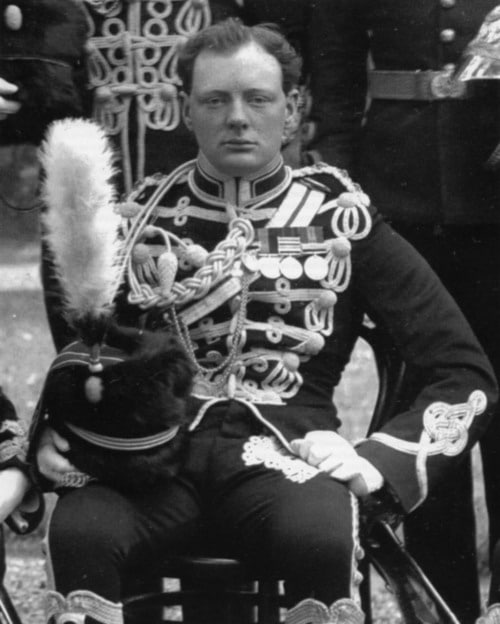
Churchill loved history, and he loved tradition. His “veneration and enjoyment of ceremony, color, gaiety, pageantry, and formality,” Manchester writes, began “in youth and early manhood, especially in the company of the officers of the 4th Hussars.” As a cavalryman, his military days had been full of long, decorous banquet dinners in which he donned his ornate blue and gold uniform and practiced his best table manners. He continued the tradition of having such formal meals after he left the military; both lunch and dinner at Chartwell were drawn out affairs, and though they were hosted in the comfort of his own home, he dressed up for them to the nines. Such rituals, Churchill felt, were essential for a rich, satisfying life.
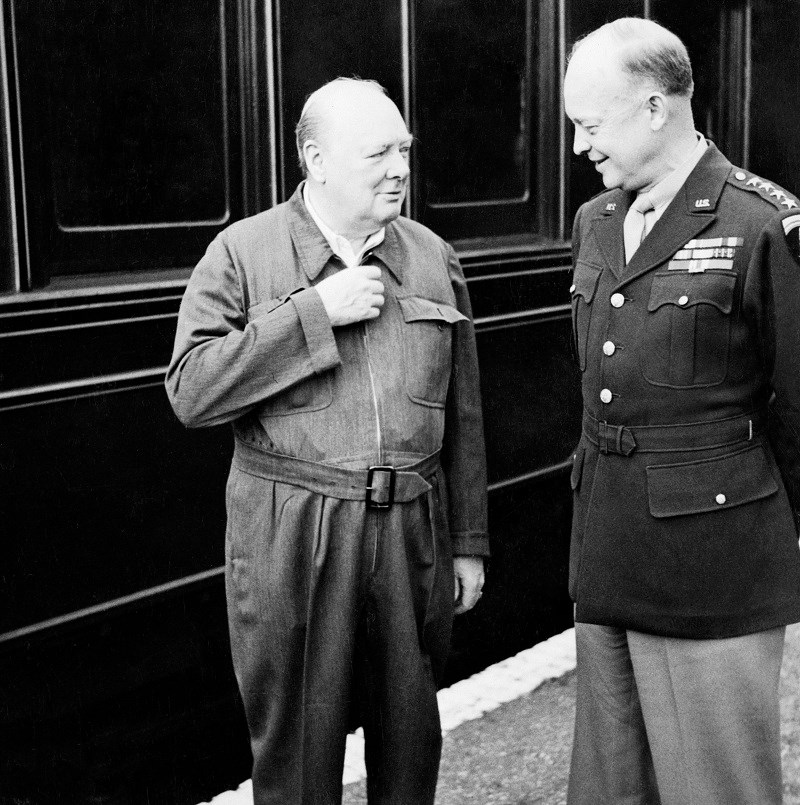
But, Churchill also broke from the status quo wherever he saw fit. As Pug Ismay, his chief military assistant, put it, Winston “venerated tradition, but ridiculed convention.” From his love of being in the nude to his unique daily routine, when Churchill thought there was a better way of doing things, he followed that impulse. This extended to his personal style; though Churchill, if anything, overdressed for formal affairs – he never attended Parliament in anything other than an old-fashioned frock coat and top hat – he donned far less conventional garb in situations where upholding decorum wasn’t as important. At home, when he wasn’t naked, he padded around in a green and gold silk dressing gown, emblazoned with dragons. During air raids he slipped into what became an emblematic get-up: his siren suit. Churchill designed these mauve, one-piece, zippered rompers himself, and had them custom-made by the tailors on Savile Row. He delighted in his siren suit’s utility – as soon as the air raid alarms sounded, he could hop right into it and prepare for the imminent shelling.
He had other amusing quirks: he talked to his cats, waltzed around to records late at night, supporting an imaginary partner and composing his speeches as he whirled around the room, and played around so much during his daily baths – even doing somersaults — that he had a special drain built to catch the overflow.
Churchill perhaps bucked societal norms most, however, simply in how genuine he was. The man that people heard on the radio, who they saw in Parliament, was exactly the same man at home. He truly was without guile. He never put on a front, took positions he did not believe in, or evinced to be other than what he was. He refused to even sign his letters “Sincerely” unless he was really, truly sincere about the missive’s message.
Intuition
“His mind had many tracks, and if one was blocked, he left it and turned to another, the very existence of which was unknown until he chose to reveal it.” –William Manchester
In his leadership, Churchill was fundamentally guided by intuition. As we discussed in regards to Churchill’s moral code, he had decided in his youth not “to discard the reasons of the heart for those of the head.” As a consequence, he was often accused of being irrational. Rather than be insulted, he cheerfully admitted to the charge, countering that so was the essence of life itself:
“The human story does not always unfold like an arithmetical calculation on the principle that two and two make four. Sometimes in life they make five, or minus three, and sometimes the blackboard topples down in the middle of the sum and leaves the class in disorder and the pedagogue with a black eye. The element of the unexpected and the unforeseeable is what gives some of its relish to life, and saves us from falling into the mechanic thraldom of the logicians.”
One of Churchill’s first experiences with the power of intuition occurred during his escape from a POW camp during the Boer War. He had no idea which way to head to reach freedom and felt completely confused and anxious. Just then, an insight hit him: “Suddenly without the slightest reason all my doubts disappeared. It was certainly by no process of logic that they were dispelled. I just felt quite clear…[where] I would go.” Churchill ended up at the one home for hundreds of miles in which the inhabitants were friendly to the British.
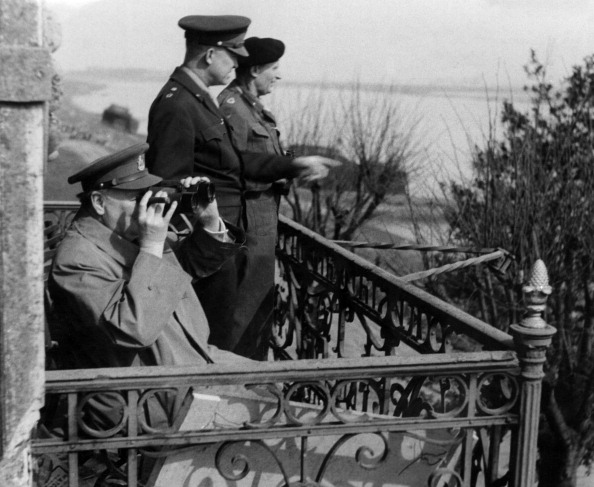
Churchill continued to rely on his intuition as he got older. It not only guided his decisions, but also gave him insights and premonitions about the future. He possessed, Manchester posits, “the painter’s gift for seeing myriad vistas, far and near.” He was one of the first public figures to recognize the danger Hitler posed, and he also conceived of a vision of how the country would have to be united to defeat him. And this was far from his only accurate prediction; Churchill foretold the policy of MAD (mutually assured destruction), the potential and dangers of atomic energy, bioengineering of crops and animals, the invention of the television, and more.
While Churchill was sometimes lampooned for his ideas when he first articulated them, his prescience was frequently borne out in time. As Harold Macmillan, one of Churchill’s wartime ministers observed, “It is strange how, abroad as well as at home, what Churchill puts forward one year as a daring paradox, becomes an accepted truism a year later.”
Sentiment and Emotion
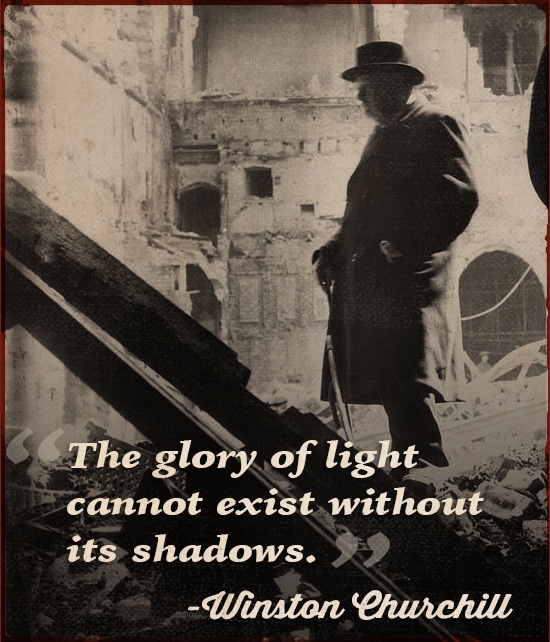
Churchill not only unapologetically embraced the power of intuition, he cheerfully admitted to being sentimental and emotional as well. He was capable of experiencing both intense joy and deep gloom, and he once battled outright depression. This has spurred a myth that he was plagued with what he called the “black dog” his whole life through, but it seems he rather was periodically hit with bouts of melancholy that fall short of clinical depression. Such despair would often arrive on the heels of some terrible news from the war, but Churchill would invariably shake off his despondency and return to a state of confident bullishness.
One thing is for sure: he felt things deeply. “I’m a blubberer,” he gladly confessed to friends, and Manchester says that “no man wept more easily.” Reminiscing with old comrades could make him misty-eyed and he would freely mourn the deaths of his beloved pets. Even composing emotional segments of his speeches could prompt a torrent of tears – both from him and his secretaries. As one of them recalled, “I would be weeping and he would be weeping, and all the while he was dictating in his marvelous voice and I’d be tap-tapping away, the both of us weeping.”
Churchill’s agnosticism did not diminish his sense of the sacred and the sentimental emotions he experienced during religious ceremonies; he wept at his grandson’s baptism, and while singing “O God, Our Help in Ages Past” with a crew of British sailors. His doubts about the existence of a spiritual realm likewise didn’t negate his ability to experience multiple planes of existence, as is exemplified by his description of what it felt like to be present in the House of Commons on the day Britain declared war on Germany:
“as I sat in my place, listening to the speeches, a very strong sense of calm came over me, after the intense passions and excitements of the last few days. I felt a serenity of mind and was conscious of a kind of uplifted detachment from human and personal affairs. The glory of Old England, peace-loving and ill-prepared as she was, but instant and fearless at the call of honour, thrilled my being and seemed to lift our fate to those spheres far removed from earthly facts and physical sensation.”
Churchill enjoyed music, literature, and poetry that stirred his emotions and offered him access to these deeper layers of life. Not only did he love and memorize virile poems like “Horatius” and “Invictus,” but he knew reams of romantic poetry by heart as well, and was especially fond of Lord Byron’s verse.
Solitude and Contemplation
To ponder his emotions and receive intuitive insights, Churchill was fond of spending time silently reflecting. Part of his daily routine was to settle into a wicker chair by a pond on his property after lunch, and he especially loved sitting by the fire in his bedroom. All the stoves in his home were heated with coal, except for this fireplace, in which he insisted on using wood. He’d sit in front of the crackling flames for long periods, poking the logs, and contemplating the world and his role in it.
Takeaways from Lesson #3
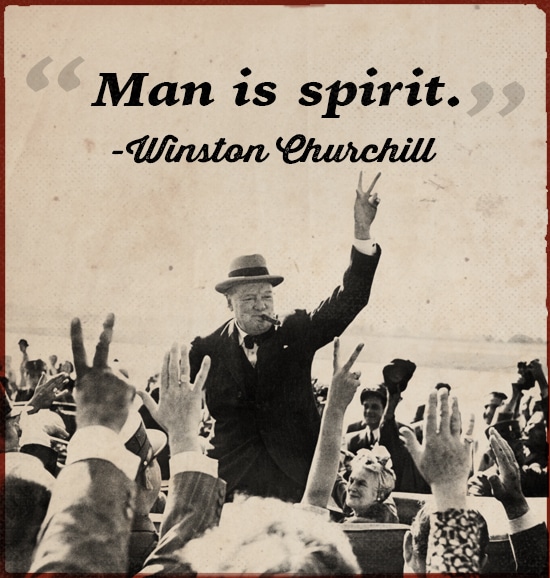
When you’re a child, the world is filled with promise and possibility, and your sense of wonder is easily kindled. You feel sure that treasure and dinosaur bones are buried in your backyard, you dream of being an astronaut, and when it comes to the excitement of Christmas Eve…fugetaboutit. Life seems like it will proceed as an unending stretch of fun and good fortune.
As the years go by and you mature, you find that the world doesn’t always operate as you had hoped. Santa isn’t real. Your first love dumps you. You don’t get into the college you were aiming for. You don’t land your dream job. You dad dies before you’re thirty. Your wife has a miscarriage, and it hurts more than you dared believe.
You learn to be realistic, to manage your expectations. You put up walls. You trust less. You cloak yourself in cynicism to mitigate the sting of future disappointments.
Nothing really excites you the way it did as a boy. “Meh” becomes your watchword; “It is what it is” becomes your battle cry.
But what if “what it is” could be different? What if you had the power to reclaim wonder and optimism, simply by reframing your life with a more romantic point of view?
But I’m Just an Ordinary Guy!
I know what you may be thinking: “Sure, it was easy for someone like Churchill to embrace a romantic view of life — the epic things he experienced were romantic. But I’m not battling the Big One, I’m just living a really ordinary existence.”
Churchill certainly had some incomparable adventures, both those he sought intentionally, and those that fate thrust upon him. Yet it is well to remember that Churchill did not become prime minister until he was 65; his romanticism was not birthed during WWII but was something he had cultivated from his youth. And while he had plenty of other adventures in those six decades before the war, again, those adventures didn’t inspire his romanticism; rather, it was the other way around: his romantic mindset inspired him to seek adventure. So too, his whole life didn’t consist of endlessly exciting episodes; in many years his life was much like that of other citizens. And it was his romanticism that made such “lulls” more interesting and satisfying than they otherwise would have been. Finally, as we’ve discussed, Churchill’s enduring, lifelong romanticism was in fact what prepared him to be an effective leader once he had finally been thrown onto a monumentally heroic stage.
Whether or not our lives ever intersect with some epic task, living more romantically will make even the most run-of-the-mill day-to-day existence far richer and more luminous than it would have been otherwise. You can choose to see the possibilities of life as one-dimensional: people are just smarter apes; a rainy day is just a weather pattern; that stirring in my gut is just indigestion from eating a ham sandwich. Or, you can choose to pick up on other energies in the world and see different layers in life: people are potential heroes; a rainy day is a chance to reflect and experience the paradoxically exquisite tremor of melancholy; the stirring in my gut is guiding me towards a certain path.
Author David Foster Wallace argued in a 2005 commencement address to Kenyon College that this ability to “construct meaning from experience” was perhaps the most important skill for newly-minted adults to learn. If you master it, he promised, it will even be “within your power to experience a crowded, hot, slow, consumer-hell type situation as not only meaningful, but sacred, on fire with the same force that made the stars: love, fellowship, the mystical oneness of all things deep down.”
How to Live More Romantically
Manchester argues that it was a “collision of logic, intuition, and imagination that made Churchill who he was.” It’s also this very combination of traits that makes for an interesting and fulfilling adulthood. Yet achieving a balance of these energies isn’t easy, as it involves wedding together a bunch of different approaches to life:
- Being grounded, logical, and detail-oriented but also intuitive
- Being clear-eyed and realistic but also imaginative
- Being steady and resolute while also allowing oneself to feel deeply
- Embracing tradition while living unconventionally
Churchill himself spoke on these seeming contradictions and complexities:
- “Nourish your hopes but do not overlook realities.”
- “Facts are better than dreams.”
- “Imagination without deep and full knowledge is a snare.”
Being able to assess reality with completely clear eyes, while simultaneously exercising the capacity to see it romantically, is a rare, but attainable gift. In incorporating these divergent energies into one’s life, the effect is something like a particle collider – the contact between your different beliefs/ideas/interests creates access to new knowledge and planes of existence that wouldn’t have been possible otherwise.
But most adults don’t want to make the effort to harness that level of energy; fitting one’s identity into a far simpler narrative is much easier. Thus, some adults carry the imaginative powers of their childhood into their latter years, but fail to couple such impulses with a sober grasp of responsibility, and end up as perennial flakes. Most adults go the other way – they neglect their creative and intuitive impulses altogether, and adopt a cynical, starkly realistic view of life. “The world is what it is; what you see is what you get.” And what they get is a flat, one-dimensional existence.
There is unfortunately no roadmap for how to achieve a unique middle path between these all-too-common surrenders to a mediocre adulthood. When it comes to living romantically, one shouldn’t follow a road map either – it’s something you should discover though contemplation and intuition! With that said, here are a few general suggestions on incorporating more of the spirit of romance into your life:
Find Your Muse
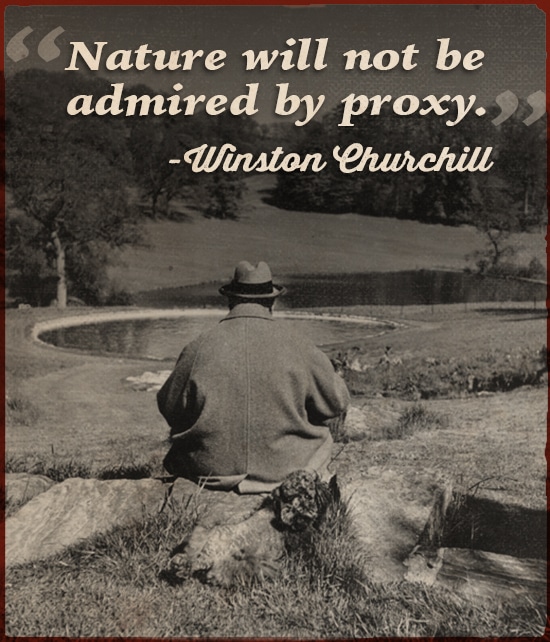
As we’ll discuss in future installments, Churchill’s romantic passions were most invigorated by studying history and participating in war. But like many romantics, he was also inspired by nature. Personally, I find that nothing stirs the soul quite like being in the great outdoors. Nowhere else do I find a greater renewal of my childlike wonder, sense of awe, and belief in the mystery and depth of life. The effect is best described by Emerson:
“Crossing a bare common, in snow puddles, at twilight, under a clouded sky, without having in my thoughts any occurrence of special good fortune, I have enjoyed a perfect exhilaration. I am glad to the brink of fear. In the woods too, a man casts off his years, as the snake his slough, and at what period soever of life, is always a child. In the woods, is perpetual youth.”
Whatever your own muse, every adult needs something that periodically awakens them from the slumber of apathy and cynicism and reinvigorates their spirit.
Participate in Rituals, Both Traditional and of Your Own Making
The power and potential of rituals are myriad: they lend a narrative structure to your hero’s journey, foster a sense of wonder and awe, act as a conduit for intuitive insights, facilitate personal transformations, and put you in touch with the rich possibilities, deeper layers, and sacred realms within our ordinary, profane existence.
While traditional rituals may seem antithetical to the creative spontaneity prized by romantics, they paradoxically can be the most inspiring and transportive. For example, few things renew my sense of wonder and mystery like attending Christmas Eve Mass. Even simple rituals like table etiquette lend an extra texture to our day-to-day existence. Upholding such traditions not only lends richness to your own life, but creates a shared world with others – a time out of time that feels extra-ordinary.
But there are times to be a nonconformist, too. Creating your own rituals, such as establishing a unique daily routine, or simply making coffee with a French press each morning, can place us in a calm, focused mindset that opens our spirit to receiving the currents of intuition and getting in touch with the energies and rhythms of life.
Intentionally Stir Your Emotions
When the prefrontal cortex – the disciplined, rational, executive part of the brain – finishes “settling” in your mid-twenties, you begin to experience emotions less intensely. The upside of this is that you’ll feel steadier and experience far less of the jagged emotional highs and lows common to youth. But the downside is a decrease in passion, and more flatness to your feelings. This is why grownups often seem dull and lacking in passion and depth.
To maintain a little more emotional richness in adulthood, without sacrificing the solid footing of maturity that’s essential for making progress, it’s important for adults to intentionally partake in experiences that pique their deeper feelings. So take a tip from the Victorians, who, while they valued keeping a stiff upper lip during life’s unpredictable storms, purposefully engaged their emotions at times of their own choosing. For Churchill, this meant listening to music from his youth and the 19th century in general (a period of history he was nostalgic for), reading romantic poetry, and allowing himself to be sentimental about special events and rituals. For example, Christmas was Churchill’s favorite time of year, and he would absolutely deck out the halls of his house with decorations that evoked the season, and all its nostalgic, heartwarming sentiments.
All of Churchill’s methods are effective, especially listening to music. Turning on a song from the days of your passionate youth can bring back the deep feelings that used to rule your heart, and listening to music you enjoyed during any significant period of your life stirs those old memories and their accompanying emotions. Every once in a while I’ll put an album that got a lot of play during an important time of my life into a metaphorical vault; I won’t listen to it for years, and then will later dust it off occasionally to purposefully transport myself back into the emotional landscape of the past. Churchill had a similar idea:
“I have got tunes in my head for every war I have been to, and indeed for every critical or exciting phase in my life. Some day when my ship comes home, I am going to have them all collected in gramophone records, and then I will sit in a chair and smoke my cigar, while pictures and faces, moods and sensations long-vanished return; and pale but true there gleams the light of other days.”
Reframe Your Reality
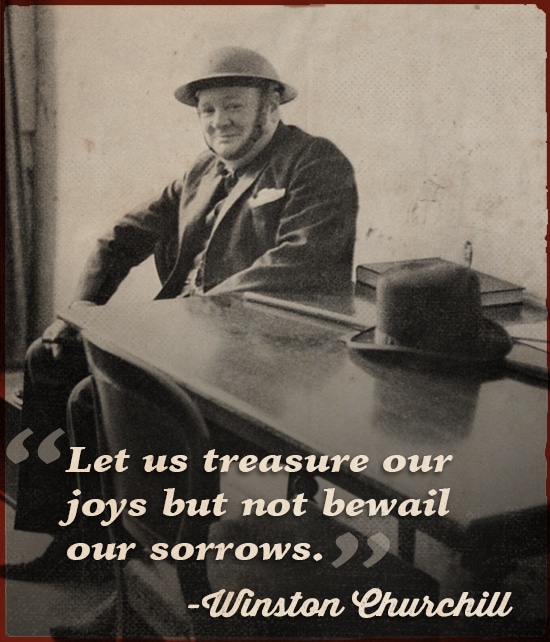
A central part of imbuing your life with greater romanticism is being able to, as Wallace put it, “construct meaning from experience.” You have to be able to shift the narrative on any experience, no matter how difficult or mundane. Wallace gives the example of considering the guy who cut you off in traffic; rather than just being an a-hole, he may be in a hurry because he’s taking his son to the hospital. This kind of re-framing isn’t about being naïve – but conceiving of other possibilities for a given situation.
Are you slaving away at a job you don’t like, or venturing out each day to protect your family from hunger and want? Are people just callous, or is every man fighting a hard battle hidden from view? Is marriage a hard slog, or an exciting journey? Is a layoff the end of your dreams, or the beginning of a new adventure? Is whatever challenge you’re experiencing a miserable turn of events, or a chance to become a better man?
If you embrace the chance to author your own life, the meaning of such things is never set in stone. Squalid or romantic – it’s your story, and you decide.
Make Time for Reflection
The greatest enemy of romanticism is the busyness inherent to adult life. Emotions, intuitive insights, a sense of wonder – such currents can only be accessed from a place of stillness. When our lives consist of rushing from one to-do to the next, we are forced to exist on only the most superficial layer of life.
Romanticism is like a faint radio signal we must home in on within a world of static: we can only hear it when we break away to a quiet place, empty our mind of other noise, and focus on finding it. Times of prayer, meditation, and overall reflection are therefore essential to keep us in tune. Laying under the Christmas tree to look up at the lights doesn’t hurt either.
William Wordsworth, the quintessential romantic poet, wrote a few lines of verse that sum all of this up splendidly:
“My heart leaps up when I behold
A rainbow in the sky:
So was it when my life began;
So is it now I am a man;
So be it when I shall grow old,
Or let me die!
The Child is father of the Man;
And I could wish my days to be
Bound each to each by natural piety.”
Or as Churchill put it, “It is quite astonishing to reach the end of life and feel just as you did fifty years before.”
When was the last time your heart leapt up to embrace the wonder and awe and mysteries of life?
The Winston Churchill School of Adulthood will adjourn for winter break, and reconvene in January. See you then!
Read the Entire Series
The Winston Churchill School of Adulthood Is Now in Session
A Prerequisite Class on Becoming the Author of Your Own Life
Lesson #1: Develop a Mighty Moral Code
Lesson #2: Establish a Daily Routine
Lesson #4: Cultivate a Nostalgic Love for History
Lesson #5: Don’t Give Up Your Sense of Adventure
Lesson #6: Don’t Be Afraid to Start a Family
Lesson #7: Work Like a Slave; Command Like a King; Create Like a God
Tips on Hustling, Leadership, and Hobbies from Winston Churchill
Conclusion: Thought + Action = An Awesome Adulthood
_________________________________________
Sources:
The Last Lion Trilogy by William Manchester
Tags: Winston Churchill


